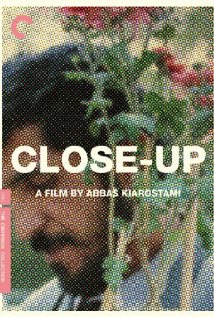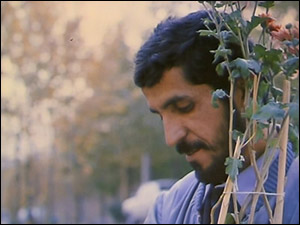Close Up (Day 26)

My Opinion: 8.0 || Peculiar, bold, fascinating film — never seen anything quite like it. I can easily imagine people hating the movie’s oddness or finding it dull, but I was absorbed from start to finish. The realism is powerful, and the story, though slight, yields a lovely portrait of one man’s inept but heartfelt desire to create art and feel important.
TITLE: Close Up (Nema-ye Nazdik)
DIRECTOR: Abbas Kiarostami
LANGUAGE: Persian | COUNTRY: Iran
YEAR: 1990
PROFILE: Drama | 98 minutes | IMDb (8.0)
SYNOPSIS (Courtesy of IMDb): Pretending to be Mohsen Makhmalbaf making his next movie, Ali Sabzian enters the home of a well-to-do family in Tehran, promising it a prominent part in his next movie. The actual people involved in the incident re-enact the actual events, followed by the footage from the actual trial that took place.
Strengths: Part documentary, part re-staging of real events, the film blurs the boundary between fiction and reality — but does so with effortless sincerity. You could imagine this being done with arch cleverness that calls attention to itself, but this isn’t post-modern game playing. In fact, it’s one of the more earnestly simple and direct movies I’ve seen.
Weaknesses: There’s very little to fault here. Because the events are presented out of sequence, we watch Sabzian’s arrest and its immediate prelude after we’ve already seen the aftermath. Because we know exactly what’s going on and know that he’s being trapped, the scene is a little difficult to watch. Not because it’s cruel or tedious but because the moment and its consequences have already been explored and because we feel so badly for Sabzian. Very minor criticism.
Characters/Performances: The characters — if we can call them that — are nearly a ll playing themselves: re-enacting (or perhaps, at the end, not acting at all) the actual events. These scenes are interspersed with extensive coverage of Sabzian’s trial. At first, I took the trial scenes to be re-enactments, but then it occurred to me that I might be watching the actual trial footage. The uncertainty was marvelous. Every performance is affectingly natural, with Sabzian at the center as a man of great gentleness and sincerity.
Best Moment: Sabzian’s testimony about the power and significance of film in his life is one of the most affecting descriptions I’ve ever seen of the value of art. The same for his testimony about personal desperation and the desire to feel important and respected.
Meta Commentary: At the risk of being culturally simplistic, I have to observe that I’ve watched two Iranian movies so far in this run (this is the 30th film), and they’ve both been outstanding. Either that’s just a coincidence (two lucky draws) or . . . Iranian cinema kicks ass. I’m inclined toward the latter. Interestingly, both are courtroom dramas that are deeply concerned with the impact of small lies, the nature of honesty, and the many ways interpreting both truth and human motivations. And both are directed with extraordinary naturalism and subtlety.
File Under: mock documentary, courtroom drama, filmmaking, art, deception, forgiveness

Pingback: Feed Me Subtitles: Best of The First Month « Folded Story Project
Pingback: Certified Copy (Day 92) | Feed Me Subtitles
Pingback: The End For Now | Feed Me Subtitles